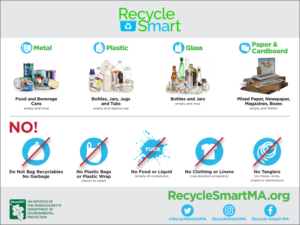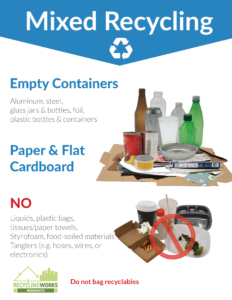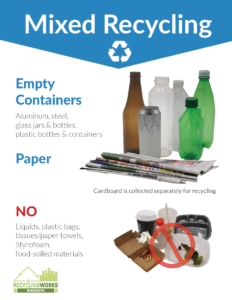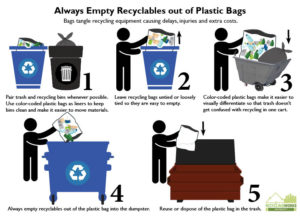Single stream recycling (or “mixed” recycling) is a system in which recyclable materials such as cardboard, paper, and plastic, metal, and glass containers are collected together for processing. Single stream recycling now accounts for the majority of commercial and residential recycling due to the efficiency and cost savings it offers. Most Massachusetts material recovery facilities (MRFs) have converted to be able to accept and process this mixed recycling.
Establishing a single stream recycling program provides many benefits for businesses and institutions, including savings through avoided 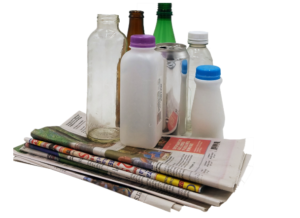 disposal costs, compliance with waste bans, progress towards sustainability goals, reductions in greenhouse gas emissions, and conservation of resources during manufacturing. In order to maximize the monetary and environmental benefits of single stream recycling, it is important for businesses and institutions to collect only the proper materials and prevent contamination from materials that should not be placed in single stream recycling containers.
disposal costs, compliance with waste bans, progress towards sustainability goals, reductions in greenhouse gas emissions, and conservation of resources during manufacturing. In order to maximize the monetary and environmental benefits of single stream recycling, it is important for businesses and institutions to collect only the proper materials and prevent contamination from materials that should not be placed in single stream recycling containers.
How are Single Stream Materials Recycled?
Single stream recyclables that businesses and institutions collect at their facilities are transported to a MRF to be sorted and processed into raw material streams for manufacturing. Collecting mixed materials saves space both inside the establishment and at the loading dock area.
Once recyclables reach the MRF, they are sorted using a combination of manual, mechanical, magnetic, and optical methods. Once the materials have been processed, they are baled and sold on national and international markets for the production of new goods. Click here to view a map and list of MRFs in Massachusetts.
While recycling end-markets fluctuate in response to numerous factors, markets exist for all recyclables collected through single stream and accepted at MRFs. However, it is imperative to maintain the cleanliness of recycled materials. MRFs need to be able to sell commodities to manufacturing outlets to minimize processing, maximize returns, and reduce the amount of residual materials that are sent for disposal. Businesses and institutions can help maintain the value of recycled materials by following single stream guidelines and minimizing contamination in the recycling stream through bin placement, signage, and education.
What Materials Should be Collected for Single Stream Recycling?
Single stream MRFs are designed to sort and process only certain materials, and not all materials displaying a resin code (recycling symbol with a number in the center) can be placed in single stream recycling. For guidance on which materials can be accepted by and processed by single stream MRFs in Massachusetts, please refer to the Recycle Smart MA graphic below for a typical list of accepted materials.
Items listed in the “No” section of the Recycle Smart MA graphic will prevent the proper processing of recyclable materials. Recycling in plastic bags will typically not be processed and may be disposed of as trash. Tanglers, such as plastic bags, textiles, hoses, wires, and cords will interfere with rotating sorting equipment, requiring maintenance, which increases cost and jeopardizes worker safety. Small items, such as loose bottle caps, plastic utensils, shredded paper, and broken glass, tend to fall through gaps in the equipment at MRFs and wind up as residue that is sent for disposal. Food and liquids contaminate materials, which can ruin their market value. A high percentage of unacceptable materials in a load may result in it being rejected at your business, or the MRF, and possibly redirected to be disposed of as trash.
Some businesses may choose a “modified single stream” program where they collect one material, such as cardboard, separately from the rest of the recyclable materials. Flat cardboard can be collected loose, baled, or compacted, and this separation can result in a higher value and lower processing costs.
Source Separated Materials
Single stream recycling programs do not accept the following materials. Businesses and institutions that generate a large quantity of these materials should consider collecting them separately for recycling:
- Film plastics, including plastic bags
- Bulky rigid plastics (plastic buckets, crates, etc.)
- Styrofoam
- Textiles
- Waxed cardboard
- Shredded paper
The RecyclingWorks in Massachusetts (RecyclingWorks) Find-a-Recycler tool allows you to search our database for recycling and composting service providers in your area based on material category, location, or keyword.
Best Practices for Single Stream Programs
Equipment and Signage
- Use the right size and type of equipment for collecting and transporting materials. See the RecyclingWorks Equipment for Collecting Trash, Recycling, and Food Waste webpage to learn more about different kinds of indoor and outdoor equipment.
- Pair recycling bins with trash disposal bins across your facility, or “twin the bin.” Ensure there are easily accessible bins in all offices, dining spaces, kitchens, and public spaces, both inside and out. If bins are placed separately, the likelihood of contamination is much higher.
- Use color-coded bins for each waste stream. This will help improve the accuracy of consumers identifying the appropriate bin for their materials.
- Provide clear signage that displays a written list or images of common recyclable materials on all collection bins and dumpsters. Use verbiage that differentiates the recycling from trash, such as “mixed recycling” or “commingled recycling.” When possible, attach the signage to the bin itself to ensure that it doesn’t mistakenly get swapped. See below for examples of RecyclingWorks single stream recycling signage and contact us at (888) 254-5525 or info@recyclingworksma.com if your organization needs customized recycling and waste bin signage.
- If lining collection bins, use clear plastic bags instead of black bags. This will help prevent the recycling from being mistaken for trash and disposed of improperly. Remove any plastic bags from the single stream materials before collection and recycle them with other film plastics, unless otherwise instructed by your hauler.
- Ensure that all recycling and trash dumpsters are easily accessible to staff. Side doors on tall dumpsters help ease access. If locking dumpsters, ensure the appropriate staff have access to dumpster keys.
Examples of Single Stream and Modified Single Stream Recycling Signage
Collection
-
-
- Keep single stream materials separate from trash. Use a clear or different colored bag for recycling, or transport materials using a divided bin. Ensure that this is emphasized during employee training.
- Always flatten cardboard boxes before placing in a recycling container. The RecyclingWorks cardboard recycling graphic is available in six languages and can be used as a training tool and visual reminder for your staff: [English] [Spanish] [Portuguese] [Cape Verdean] [Chinese] [Haitian Creole]. Additional translations are available upon request.
- Empty recycling materials out of all plastic bags. Plastic bags tangle in single stream processing equipment and prevent other materials from being processed properly at the MRF. Therefore, it is important to empty recyclables from plastic bags and either dispose of the bags or recycle them in a separate film plastic waste stream. The RecyclingWorks graphic below illustrates how to effectively use plastic bag liners without contaminating the recycling stream. This graphic is also available in six languages and can be used as signage or a training tool: [English] [Spanish] [Portuguese] [Cape Verdean] [Chinese] [Haitian Creole]
- Ensure all materials are dry, empty, and free of residue. Containers do not need to be washed thoroughly, but should be empty and free of residual food and liquids. It is especially important for paper to remain dry.
- Perform inspections for contamination and recyclable material in trash. When necessary, adjust your equipment or processes and provide ongoing training for your employees.
- Establish frequent and transparent communication with your recycling hauler. Ask your hauler to notify you promptly of contamination in your recycling containers so that you can implement prompt corrective actions.
-
Education
-
-
- Provide education and outreach to employees on how to separate and reduce contamination in materials. Incorporate single stream collection practices into new hire training, and provide ongoing education sessions as needed. Provide instruction to employees who collect and transport materials on how to keep single stream materials separate from trash
-
Learn about recycling other materials
For more information on other commonly recycled materials visit these pages:
- Bottles & Cans
- Cardboard
- Construction Materials
- Electronics
- Fluorescent Lamps/Light Bulbs
- Food Waste
- Mattresses
- Pallets
- Paper
- Plastics
- Textiles
Additional Resources
-
- Contact the RecyclingWorks hotline at (888) 254-5525 or info@recyclingworksma.com to learn more about our free technical assistance.
- Find out how to start or improve your own recycling program.
- Learn more about contracting with haulers to set up your single stream recycling program.
- Learn how to plan for waste reduction, recycling, and food waste diversion at your workplace events in our Tips for Waste Reduction at Workplace Events.
- Consult the MassDEP Recycle Smart MA website for more information on materials typically accepted in single stream recycling in Massachusetts.
- Learn about Massachusetts Waste Bans.

